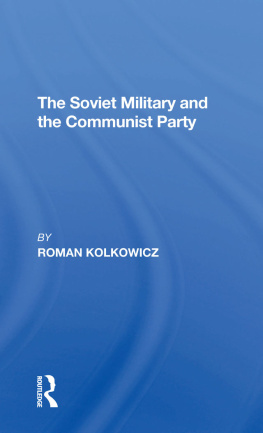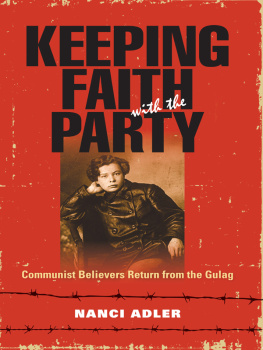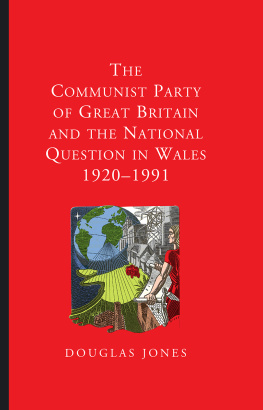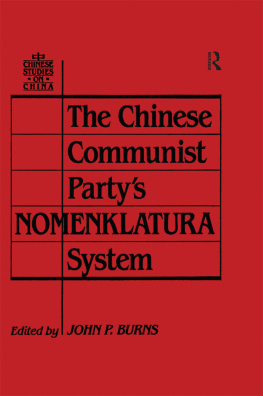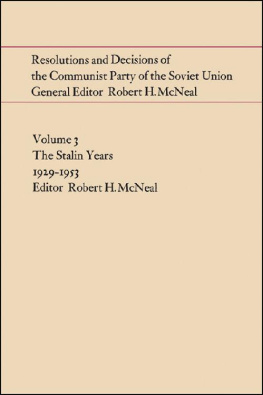THE YALE-HOOVER SERIES ON STALIN, STALINISM, AND THE COLD WAR
FUNDING LOYALTY
THE ECONOMICS OF THE
COMMUNIST PARTY
EUGENIA BELOVA
VALERY LAZAREV
Hoover Institution
Stanford University
Stanford, California
Yale UNIVERSITY PRESS
New Haven and London
Published with assistance from the foundation established in memory of Philip Hamilton McMillan of the Class of 1894, Yale College.
Copyright 2012 by Yale University and the Board of Trustees of the Leland Stanford Jr. University.
All rights reserved.
This book may not be reproduced, in whole or in part, including illustrations, in any form (beyond that copying permitted by Sections 107 and 108 of the U.S. Copyright Law and except by reviewers for the public press), without written permission from the publishers.
Yale University Press books may be purchased in quantity for educational, business, or promotional use. For information, please e-mail sales.press@yale.edu (U.S. office) or sales@yaleup.co.uk (U.K. office).
Set in Sabon Roman type by Westchester Book Group.
Printed in the United States of America.
Library of Congress Cataloging-in-Publication Data
Belova, E. B. (Evgeniia Borisovna)
Funding loyalty : the economics of the Communist Party / Eugenia Belova, Valery Lazarev.
pages ; cm. (Yale-Hoover series on Stalin, Stalinism, and the Cold War)
Includes bibliographical references and index.
ISBN 978-0-300-16436-7 (paperback : alkaline paper) 1. Kommunisticheskaia partiia Sovetskogo SoiuzaFinance. 2. Soviet UnionPolitics and governmentEconomic aspects. I. Lazarev, V. V. (Valerii Vasilevich) II. Title. III. Series: Yale-Hoover series on Stalin, Stalinism, and the Cold War.
JN6598.K7B3735 2012
324.247045dc23
2012012198
A catalogue record for this book is available from the British Library.
This paper meets the requirements of ANSI/NISO Z39.481992 (Permanence of Paper).
10 9 8 7 6 5 4 3 2 1
To our daughters, Alexandra and Keira
Contents
Preface
This study of the economics of the Communist Party of the Soviet Union (CPSU) is interdisciplinary by nature. It belongs to the area of political science but also relies heavily on the conceptual framework and research methods of modern economics. It is also a historical study that draws on primary sourcesarchival records. Not unlike many other historical studies, this project can be traced back to an archival discovery or, in this case, rediscovery. The existence of the CPSU financial records was not a secret, as the Hoover-Chadwick project microfilmed millions of documents of the Soviet ruling party during a relatively short period in the early 1990s, when Moscow archives were at the peak of their openness. By the time we first came across those documents in 2002, they had been carefully cataloged but left largely unattended by researchers. There seemed to be nothing sensational about those documents: no mentions of the party gold, no revelations of ghastly Kremlin secrets. And we were not impressed by volumes of spreadsheets, mostly filled in by handwritingthousands of numbers repeating themselves in variations over years and across the vast administrative domain of the CPSUbut we made some copies anyway. Several years passed before we got back to those documents. Initially, there was no plan on how to approach them, so we began by organizing the numbers. The first data series that we plotted did not look right. The data showed that the CPSU was only in part funded by the Soviet state and that dependence on its own revenues, primarily from membership dues, had a pronounced increasing trend. A further investigation produced more questions than answers, and the most pressing question was why the party, the stem of the Soviet po litical system, had to finance itself. In 2006, we returned to the archives intending to find the devil in the details. In the two years that followed, we dug into the layers of the party archives, fascinated by the complexity of the party machine and the scope of the data that it left behind. Surprisingly, the directors of the systemthe same system that disparaged money circulation and favored material planning insteadpaid serious attention to money matters.
Little by little, an institution designed to fund the loyalty of rational supporters of the regime began to emerge from the spreadsheets and scant narratives. The workings of this institution were difficult to understand, let alone explain to others. At the same time, the patterns in the numbers yielded a picture of an organization with its own corporate rationale driven by its own interests. The party seemed to have been turning into an instrument of the self-interested party bureaucracy rather than one of the dictatorial leadership. Could it be that the same features of the institutional design that were the regimes assets in its earlier days had turned eventually into liabilities, perhaps contributing to the unexpectedly rapid undoing of the system under Mikhail Gorbachev? The consistent flow of data dries up by the late 1960s, and in a sense, this book ends at the most interesting point. We were fortunate, however, to locate some relevant later evidence. This evidence, including the last two annual budgets of the CPSU, which surfaced in the course of preparations for the trial of the CPSU, planned by Boris Yeltsin but never started, provided some reassurance that the final destination lay on the path set in the earlier decades. Eventually, new evidence will become available on the Stalin and Khrushchev periods through the long and seemingly uneventful reign of Brezhnev to the last day of Gorbachevs Soviet Union, connecting the dots with a bolder line.
This study has had a long journey through time and space. Crucial to it was the time we spent at the Hoover Institution, both as visitors to the archives and, most important, as Campbell National Fellows in 20072008. This study would not have been possibleor at least would have taken indefinitely long to completewithout the financial and administrative support of the Hoover Institution. We are especially grateful to its associate director, Richard Sousa, for his interest in and support of this project and cannot say enough good things about the staff of the Hoover Institution Archives.
Proximity to Stanford Universitys political science, economics, and history departments was crucial for our research, interdisciplinary by nature. From scholars in all three disciplines, we received inputs that ranged from short but stimulating discussions to a workshop to thorough readings of an early draft of the manuscript. This project owes the most to Paul Gregory, Steven Craig, and Gavin Wright, our mentors, whose work and advice shaped our thinking as researchers. We are eternally grateful for Pauls encouragement, support, and occasional light nudging. Steven was the first to suggest that it was necessary and possible to develop empirical tests of our theoretical models, and the suggestion prompted us to start turning the numbers in fading ink into a dataset to be used for econometric analysis. Gavin, a wonderful host at Stanford, watched our initial efforts grow from a vague idea to a full-scale research project. For fruitful and stimulating discussions we are also deeply in debt to Golfo Alexopoulos, Bruce Bueno de Mesquita, Gerald Dorfman, Yoram Gorlizki, Avner Greif, Mark Harrison, James Heinzen, Beatrice Magaloni, Michael McFaul, Gabriela Montinola, and Robert Service, as well as to dozens of participants of seminars and summer workshops.
Introduction
Follow the money. This saying in its modern sense applies to untangling criminal conspiracies or to understanding the dynamics of elections. The same principle can be applied to understanding the workings of the Communist Party of the Soviet Union, although theoretically actors in the Soviet system were supposed to be largely indifferent to money. Goods, services, and privileges were supposed to go to the systems directors and their loyal subjects, not to the highest bidder. A party driven by ideological motives as the guiding force should have been least of all interested in cash or anything associated with monetary transactions. The CPSU, as well as other Communist parties, was traditionally studied from the perspective of politics, ideology, and governance, primarily from narrative sources.
Next page

